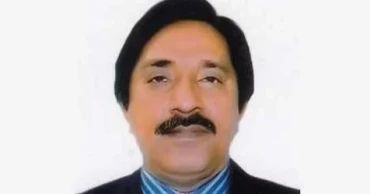NHRC
Experts call for reforms to strengthen NHRC’s independence and credibility
Experts in a roundtable discussion on Thursday said that national human rights institutions should play a pivotal role in promoting and protecting human rights.
However, despite its mandate, the National Human Rights Commission (NHRC) has faced ongoing challenges related to its independence, credibility, and effectiveness in holding public institutions accountable, they were of the view.
Concerns regarding legal and operational constraints have surfaced, limiting the Commission's ability to function as an independent, impartial and credible monitoring body.
Recent developments and growing calls for institutional reform have created an opportunity for national stakeholders to come together and discuss the pathways needed to strengthen the NHRC.
They said that a fully independent and credible NHRC is essential for upholding the rule of law, safeguarding people's rights, and rebuilding public trust.
The roundtable discussion titled “Towards an Independent and Credible NHRC: Agendas for Reform” was jointly organized by UNDP's Strengthening Institutions, Policies, and Services (SIPS) project, supported by the Swiss Agency for Development and Cooperation (SDC).
Advocate and human rights activist, Jyotirmoy Barua, delivered the opening speech.
Conforming to the NHRC Act 2009, he said the commission should be an independent body. But it is seen that the appointment of the chairman raises questions. In the past years it has been seen that a secretary of the government was selected as chairman for three terms whereas it is expected that people from the administration should be kept away from this task.
Read: NHRC chairman, 5 members resign
He proposed that NHRC should be reformed as an advisory body with allocation of enough funds and mandate to inquire allegations of human rights violations.
Former NHRC chairman Dr. Kamal Uddin Ahmed proposed a mechanism to address the situation when recommendations of the NHRC are not complied with, and said there should be budget allocation for ensuring the independent functioning of the NHRC.
Sabina Yasmein Lubna, senior programme manager of Swiss Agency for Development and Cooperation (SDC), Embassy of Switzerland said that human rights is one of the priority areas of SDC.
She stressed on the capacity building of NHRC staff and enhancing regional presence.
Anowarul Huq, assistant resident representative of UNDP, said, they want a credible and independent NHRC that should be people-centric and accountable to the people.
The commission should be open to receiving complaints of human rights violations and provide effective redress. NHRC Act 2009 should also be amended to address the flaws in the present law. The recruitment process should be made transparent and the service of NHRC should be decentralized, he added.
The dialogue brought together key stakeholders, including legal and human rights experts, media representatives, civil society organizations, human rights defenders, and representatives from the NHRC to discuss challenges and chart a forward-looking strategy for reform.
Read more: Time to prioritise electoral system reform with focus on human rights: NHRC
The discussion centered on several key concerns including discussion on the (NHRC Act 2009), legal and policy reforms, addressing legal constraints in the appointment of NHRC Chairman and members, mandate, investigative powers, functions, independence, operational challenges, examining issues and political wills related to operational independence, independence of fund, resource allocation of the commission, exploring the CSO and media’s role in strengthening NHRC's public image and accountability.
The discussion also emphasized on formulating concrete steps and proposals to enhance NHRC's credibility and trust among people.
1 year ago
Minority and female voters actively exercising their voting rights: Human Rights Commission Chairman
National Human Rights Commission (NHRC) Chairman Dr. Kamal Uddin Ahmed today said no complaints regarding voting have been received so far.
“Minority and female voters are actively exercising their voting rights. The Commission remains vigilant to ensure that citizens can vote freely and responsibly,” he said.
A delegation led by the NHRC Chairman visited polling centers to monitor election environment.
Read: Election 2024: Voting at Narsingdi-4 polling centre cancelled over alleged irregularities
As part of the visit and monitoring program, the Commission's delegation visited various areas and polling centers, including Joynagar Government Primary School, Ati Bhawal Uchcha Madhyamik Bidyalaya, Konokhola Model Government Primary School, Kaikobad Academy, Suritola Model Government Primary School, T&T High School & College etc in Dhaka.
The overall security situation, safety of women and minority voters, exercise of voting rights by the elderly and disabled individuals, the facilities provided by the centres, and human rights situation during the election were closely monitored, he said.
At this time, the NHRC delegation spoke with the presiding officer and polling agents, as well as voters representing all demographics, and gathering information on the overall situation.
During a media interview, the Commission chairman stated, “Today, we witnessed a completely peaceful and nonviolent environment.
Read: 12th Parliamentary Election: Voting begins amid opposition boycott
“The development of democratic values, tolerance, and a culture of human rights is possible through a conducive environment for independent voting,” he said.
He hoped for a peaceful environment and a fair election. He further mentioned that the Commission has taken effective steps for the protection of human rights before, during, and after the election.
The Commission will also closely monitor the security situation post-election. During the observation, NHRC members Salim Reza, Aminul Islam; Secretary Sebastin Rema; Director (Complaints and Inquiry) Ashraful Alam; Director (Administration and Finance) Kazi Arfan Ashik, and other senior officials were present.
2 years ago
Attending mother’s janaza with handcuffs, leg irons: NHRC recommends action
The National Human Rights Commission(NHRC) has recommended taking action against the authorities concerned for whom a BNP leader had to attend his mother's janaza wearing handcuffs and leg irons in Gazipur.
The commission condemned the incent through a press release on Thursday.
According to media report, BNP leader Ali Azam was released on parole for three hours on December 20 and was allowed to attend his mother's Namaz-e-janaza.
However, he was handcuffed and shackled throughout the parole period that sparked criticism across the country.
Read more: Handcuffs, leg irons should’ve been removed during funeral of BNP leader’s mother: Info Minister
The commission thinks that taking a prisoner to his mother's funeral with handcuffs and leg irons after being released on parole is not only inhumane but also against the constitution and fundamental human rights of Bangladesh.
Besides, the directive of the High Court regarding handcuffing an accused was not followed in this case, it said.
In order to prevent the recurrence of such incidents, the Commission urged the authorities concerned to take legal action against those involved in the incident.
3 years ago
Defend rights on our own initiative, president tells NHRC
President Abdul Hamid on Monday ordered the National Human Rights Commission to play a strong role in protecting human rights on its own initiative without depending on others.
He said this when a delegation headed by Commission Chairman Nasima Begum went to present the Commission's Annual Report-2021 to him at Bangabhaban.
During the meeting, the delegation briefed the President about the overall activities of the Commission and various aspects of the annual report.
President Hamid also asked the Human Rights Commission to properly fulfill the responsibilities assigned to them.
Read: Chief Justice presents annual report on JSC to President Hamid
Alongside, he suggested raising public awareness about human rights at the grass root level. Besides giving necessary advice to the government to protect human rights, the President also directed the Human Rights Commission to work for their implementation.
The president's secretaries were also present during the meeting.
3 years ago
President asks NHRC to be more vibrant
President Abdul Hamid on Tuesday said the National Human Rights Commission (NHRC) would have to be more active in protecting the interests of the people and making the government more accountable.
He said this when a four-member NHRC delegation led by its chairperson Nasima Begum presented the commission's annual report of 2020 to the President at Bangabhaban.
Read: President Hamid calls for boosting ICT skills of judges
The President said the Commission could play an important role in ensuring transparency and accountability in the activities of the government as well as upholding the public interest and human rights.
The delegation briefed the President about the overall activities of the Commission and various aspects of the annual report.
Read: President Hamid urges ACC to go hard after the corrupt people
Commission’s full-time member Kamal Uddin Ahmed and member Jasmine Ara Begum were included in the delegation.
Secretary to the President's Office Sampad Barua and Military Secretary Major General SM Salahuddin Islam were present.
4 years ago
Indian govt 'ready to probe Bengal post-poll violence'
Barely 20 days after India's top human rights body recommended a central probe into post-poll violence in the eastern state of West Bengal, the federal government on Tuesday expressed its willingness to take over the investigation.
"A federal agency like the Central Bureau of Investigation (CBI) or the National Investigation Agency (NIA) is ready to probe the allegations of post-poll violence in West Bengal," India's additional solicitor general YJ Dastoor told the High Court in state capital Kolkata.
The National Human Rights Commission (NHRC) last month made the recommendation for a federal probe in its report to a five-judge High Court bench. It was asked to investigate the allegations of post-poll violence by the same court only.
In its report, the Commission clearly accused the Bengal government of turning a blind eye to "grievous offences like murder and rape" allegedly perpetrated by members of Mamata's ruling Trinamool Congress on supporters of the state's opposition BJP.
Read: India's human rights body favours federal probe into Bengal post-poll violence
"To compound the problem, violence and intimidation has continued. There is palpable fear among victims against police and goons of the ruling party. Many displaced persons haven't yet been able to return to their homes. There have been several sexual offences," it said.
Bengal Chief Minister Mamata Banerjee had, however, slammed the NHRC for "leaking the report" at the behest of India's ruling BJP. "The BJP is now using impartial agencies to settle political scores and malign our state," she told the media last month.
It may be mentioned here that the High Court, on July 2, came down heavily on the Bengal government for the post-poll violence in the state that claimed a number of lives. "The state is in denial mode. The administration has been caught on the wrong foot," it had said.
UNB had earlier reported about as many as 16 deaths in post-poll violence in Bengal, which prompted the Indian Home Ministry to seek a report from the state administration.
In fact, on May 6, a day after she was sworn in as the chief minister of Bengal for the third time, Mamata announced a compensation of Rs two lakh each for the families of 16 people killed in post-poll violence in the state.
Read: High Court raps Bengal govt again for post-poll violence
"At least 16 people -- mostly from the Bharatiya Janata Party (BJP) and the Trinamool -- died in post-poll violence. We will pay a compensation of Rs two lakh to their family members," she had said.
Appealing for calm, Mamata had also asked her supporters not to indulge in any violence. "Bengal is a peace-loving place. During the elections, there has been some heat and dust and calm. The BJP did a lot of torture. But I appeal to all for calm."
Bucking anti-incumbency, Mamata scripted history on May 2 by single-handedly pulling off an astounding victory in the assembly election, staving off a massive challenge from Prime Minister Narendra Modi's ruling BJP but also decimated the Left Front.
Bengal had witnessed the most high-profile contest in India's recently held state elections. While Mamata harped on being Bengal’s daughter, the BJP asked people to vote for "change and socio-economic development" after 50 years of Communist and Trinamool rule.
4 years ago
UNDP to address human rights issues in COVID-19 through innovations
The United Nations Development Programme (UNDP) under its Human Rights and Justice Programme (HRJP) has launched Low-Value Grants (LVG) to foster small scale innovative actions to address human rights issues during and after COVID-19 situation in Bangladesh, engaging civil society organisations (CSOs) and community radio.
5 years ago
UNDP, NHRC join hands with CRI to campaign for women’s safety
Centre for Research and Information (CRI)’s youth platform Young Bangla in collaboration with Human Rights Programme-UNDP, and the National Human Rights Commission (NHRC) has set out on a campaign titled ‘Women’s Safety in Public Places (WSPP)’.
5 years ago
Delwar previously raped Noakhali victim multiple times: NHRC
The Noakhali molestation victim was previously raped several times at gun-point by the accused Delwar Hossain, said Al Mahmud Faizul Kabir, the director of investigation from the National Human Rights Commission (NHRC) quoting the victim on Tuesday.
5 years ago
NHRC expresses concern over killing of 26 Bangladeshis in Libya
The National Human Rights Commission (NHRC) on Friday expressed deep concerned over the killing of 30 migrant workers, including 26 Bangladeshi nationals, in Libya reportedly by some human traffickers.
5 years ago




.jpg)

.jpg)






